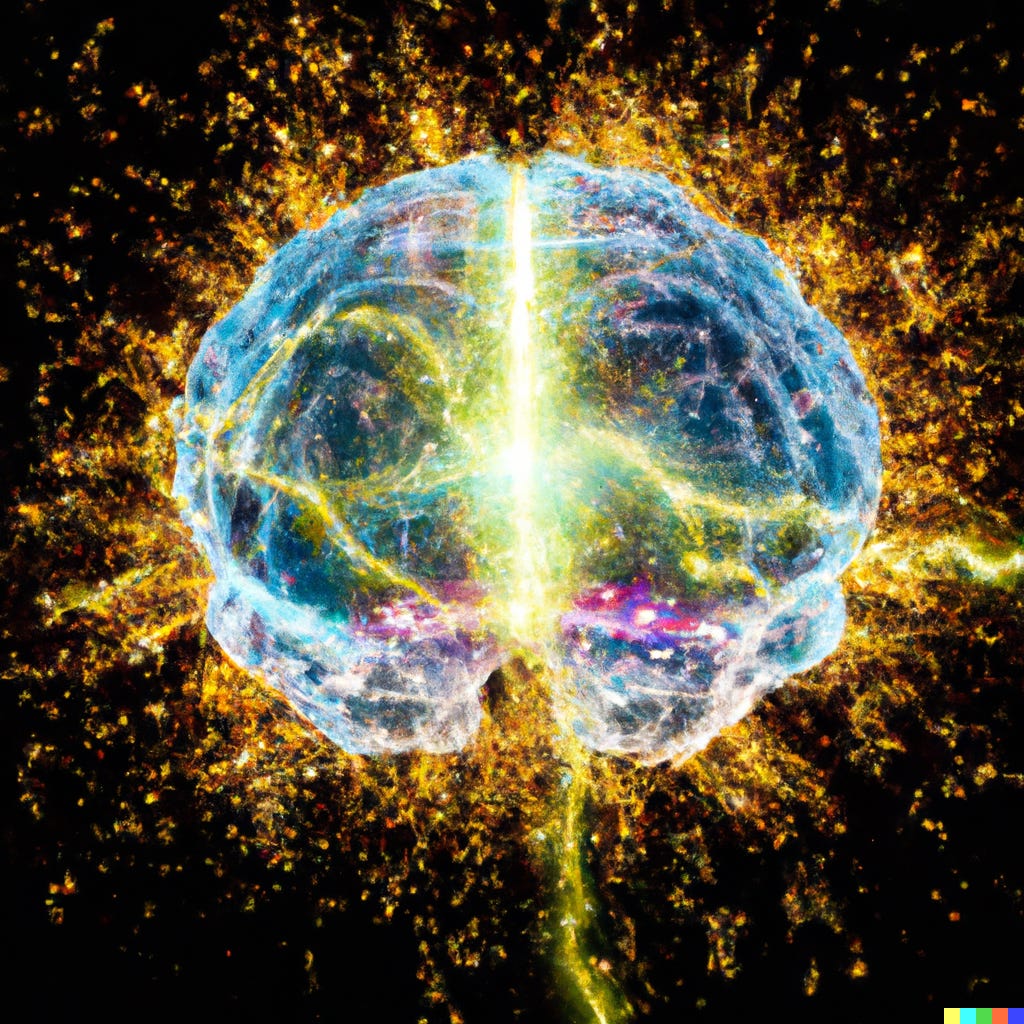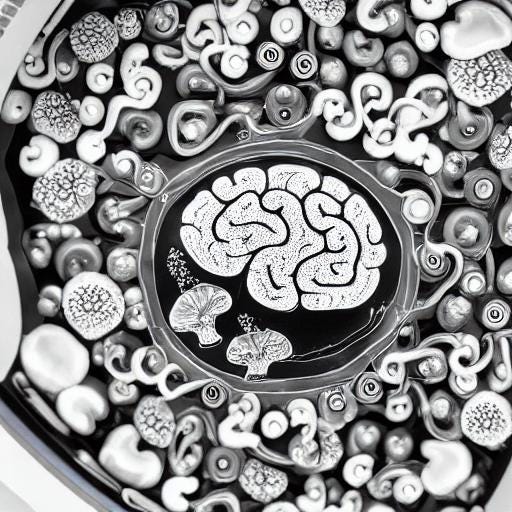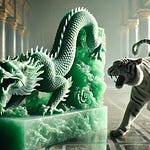Rumor has it that when you take magic mushrooms, ayahuasca, or LSD, you hallucinate. You see walls moving, you smell sounds, you imagine things that aren’t present, your mind becomes non-linear, and you might even think you can fly. Have you ever experienced this? Pretty cool right? Maybe you were scared. Maybe you couldn’t get enough.
But, what if they weren’t hallucinations?
In The Doors of Perception, Aldous Huxley imbibes with mescalin and explains that maybe the brain makes us “hallucinate” the life we call sober, and hallucinogens actually allow us to experience reality unfiltered. Some good science backs this distinction up. Huxley writes:
"The function of the brain and nervous system is to protect us from being overwhelmed and confused by this mass of largely useless and irrelevant knowledge, by shutting out most of what we should otherwise perceive or remember at any moment, and leaving only that very small and special selection which is likely to be practically useful […] a measly trickle of the kind of consciousness which will help us to stay alive on the surface of this particular planet.
Every individual is at once the beneficiary and the victim of the linguistic tradition into which he has been born—the beneficiary inasmuch as language gives access to the accumulated records of other people's experience, and the victim in so far as it […[ bedevils his sense of reality. He is all too apt to take his concepts for data, his words for actual things."
So our brain is actually the hallucinogenic device. It shows us a very simplified view of the world. And I don’t just mean simplified; I mean gutted. Bless our five senses, but we can’t process even a moment of unfiltered inputs from them. Like a good assistant, our brain is always looking for a way not to bother us about something. It decides whether the tingle on your leg is a mosquito or the wind. Sometimes the data doesn’t match reality, and we end up swatting at an empty leg. Our brain stops us from hearing the buzzing air conditioner in our room, but then you can’t unhear it once someone points it out.
On top of this ability to filter out unnecessary information, our brain also gifts us the confidence that we actually perceive all there is to perceive so we don’t doubt ourselves. This is called the rich phenomenology experience, and I discuss it more in this post. Conscious animals are all confident that what they/we see and hear is the whole truth—reality. But that is the grand hallucination.
Who is the real hero?
Two reputable scientific investigations bring our reality into question. First, when people on psychedelics have their brains imaged in an fMRI machine,1 one would expect their minds to be going wild like fireworks coming up with all sorts of hallucinations to feed the consciousness. In reality, their brains are, across the board, calmer, quieter, and less active. That is, the brain is simply doing less work. What does it mean for the subjective experience of a less active brain to be much more active and lively and full of movement, color, and insight? Interestingly, fMRIs of people on LSD and mushrooms look very similar to a child’s MRI. It goes to show that psychedelics put you in a more receptive mode where you have less control over your inputs.
This study actually changed the way I parent my children. I now see that my role as a father is to facilitate their psychedelic trip. When they feel scared, I’ve got to make them feel safe; when they are really enjoying something, I’ve got to make it fun for them. They are a friend who I promised to sit by as they go on their psychedelic journey. We all need chaperones because our brain is not prioritizing survival when its in these states.
Quantum physics has shown us that physical reality is a lot more interconnected and bizarre than our five senses let on. Quantum entanglement connects atoms across hundreds of miles—yet they are connected intimately in different dimensions. That isn’t woo; that’s where modern science has led us. You can separate two entangled atoms by 150 miles; when you shake one in a certain pattern, the other one shakes. And they aren’t communicating; they shake instantaneously—faster than the speed of light—because they are still connected in another dimension.
We know all space is filled with a network of dark energy and mass that accounts for the whole universe. Billions upon billions of subatomic particles are passing through our bodies at each moment without us noticing. The sun seems like it shines light down so we can see the world, but that’s just the energy we evolved to see. If we could see other existing energies right in front of our face—the world would be all light. Our brains limit what we see so that we can partake in the mundanity of life.
We walk down the street and have the cockiness of feeling like we see and perceive everything in our sightline, but we see such a small sliver of visible light and within that visibility, we are aware of even a smaller slice.
If you could take a drug that made you see those particles, feel them, hear them, would that be a hallucination? What about weird little energy shifts rather than discrete particles? What about shapes in shadows, the ulterior motives of a friend, the sweetness of a stranger, the divinity of a flower or a bug? That’s what psychedelics do.
They aren’t making you hallucinate, they are putting you in touch with subtler energies your brain usually really works hard to keep at bay.
If you give a rock a psychedelic, nothing happens.
Since I’ve started this way of thinking, I’ve often felt that the most aware being in the world is simply a rock. It has no brain to stop it’s perception, it is receiving all things with no filter, no calculation, no reaction. Consciousness in a biological flesh suit involves severely narrow awareness and senses. We don’t see the whole visual spectrum, hear the whole sound spectrum, smell all the smells, or taste all the tastes. We just sense what works for humans and what we need to persist. Everything else feels imaginary.
The fact that this flesh suit reality is not the whole reality is exemplified by the fact that most high doses of ayahuasca, mushrooms, LSD, etc, result in the same experience: full ego dissolution and complete connectedness with the energy field that pervades the universe. Even more tellingis how boring of a trip this is to hear about. It falls under the same category of telling someone about your dreams: it’s entertaining and informative here and there but if you talk about it all the time and put too much value on it, it turns meaningless or even psychotic sounding.
In everyday life, it can be a bit eh to discuss ultimate connectedness throughout the universe. Few people want to live with the awareness that they are intimately connected and in-differentiable from Tucker Carlson. The ultimate reality—as opposed to flesh-suit reality—has no differentiated personalities or discrete bodies.
This is what is meant by “we are all one.”
And that’s why some stoner’s trip—“I was connected to all beings and I saw the divine light of oneness!”—is more of a cliche than a revelation to the sober mind. The sober mind has no room for these shenanigans, it’s focused on shitting and eating.
So what do we do with this information?
Well, there isn’t much to do. In my life, I have crystalized this all into a little motto: the mundane is divine, the divine is mundane. This reminder gives me perspective on all happenings. These divine experiences of connectedness and universal perspective are really no different from the experience of unloading the dishwasher or kicking a ball—each are simply opportunities to surrender into the universally acknowledged fact that we are not really in control of our fates to the degree our brains would like us to believe. That is why Alcohol Anonymous’ infamous serenity prayer goes:
God grant me the serenity
to accept the things I cannot change;
courage to change the things I can;
and wisdom to know the difference.
Importantly, AA’s founder got the idea for the program after having experienced high doses of LSD, and realizing the perspective could help people disembark from the vices of their lowly flesh suits and connect with the divine. In the 60s, when it was founded, people would rather pray to God than do drugs so all references to psychedelics were artfully avoided. But that is why AA’s God feels very non-Christian.
AA’s god is about a mundane “higher power.” This higher power is the jello—for atheists and zealots alike—in which we all sit. This higher power is the answer to all your questions, whatever they may be.
Drugs and psychedelics are just shortcuts to ecstatic states of consciousness that can be accessed in other ways–sensory deprivation, meditation, hunger, insomnia, etc. Most meditation focuses on calming the mind so that true experience can be. . . well, experienced.
This goes to show that what our brain does is help us hallucinate a much simpler, easier sort of reality, and hallucinogens and other mind-calming endeavors open our mind up to the confusing, sometimes scary, sometimes beautiful chaos that surrounds us.
I believe, whether you’re on psychedelics or off, that when you get overwhelmed by life and your external inputs, the only thing you can do is simply breathe through it and wait for it to pass. A lot of our time as a society is spent trying to get rid of overwhelm and discomfort, but this only breeds more.
I use this mundane, boring, and cliche mantra: Surrender, breathe through it, and trust in a higher power.
When I take deep breaths, I find true awareness, until, of course, it slips away a moment later and I have to track it down again. And again. And again, until this hallucination ends and I’m returned to the dirt from where all rocks come.
It will be so easy to be conscious then.
As always, I end my posts with a picture of my sons and a picture of my breakfast:
This science from from Michael Pollen’s book How to Change Your Mind.














